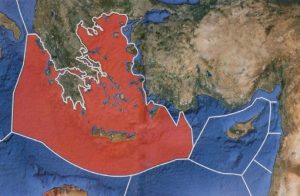March 18, 2012 Strategy International.

There is an ongoing dispute between Turkey and Greece on the delimitation of the continental shelf, and in extension, we can say on EEZ which each country can claim. Turkey has not signed the UN Convention on the Law of the Sea
 By Commodore (Rt) Dimitrios Tsailas,
By Commodore (Rt) Dimitrios Tsailas,
General Director of Operations, & Scientific Board, Strategy International
Until the first U nited Nations Conference on the Law of the Seas (1958) fishing rights for the coastal states was exercised only inside the territorial waters, which in no case were extended beyond 12 nm. This led to the need of establishment of an economic zone within the coastal states would have the possibility of exploitation of their sources, while the other states will not be excluded from exercising their basic rights deriving from the establishment of freedom of the seas.
In a sense, therefore, the exclusive economic zone (EEZ) appeared in order to compensate the economic needs of coastal states without, on the other hand, increase the breadth of territorial waters.
Some known examples of disputes for the EEZ are included in the “cod war” between UK and Iceland. A series of conflicts in the 1950s and 1970s between the two countries over fishing rights in the North Atlantic. Also Norway and Russia both challenge the territorial waters and the EEZ, in relation to the archipelago of Spitsbergen. In April 2010, an agreement was reached in principle between the two states pledged to resolve the conflict. The South China Sea is a site where there is an ongoing dispute between several neighboring coastal States.
Contemporary developments, led to the international introduction of the EEZ at the third United Nations Conference on the Law of the Seas in 1982. In chapter V, article 55 of the Convention stated that the EEZ is a maritime area, which may extend up to the range of 200 nm (370 km) beyond the territorial sea in which the coastal state has special rights in research and exploitation of marine resources, including energy production from the sea, the currents and the supernatant wind. Additional, coastal states concerned some more other rights within the EEZ, relating to exclusive competence or jurisdiction in the placement and use of artificial islands and other installations, in the conduct of scientific research and the protection of marine environment from pollution.
There is an ongoing dispute between Turkey and Greece on the delimitation of the continental shelf, and in extension, we can say on EEZ which each country can claim. Turkey has not signed the UN Convention on the Law of the Sea. But at the end of 1986 declared EEZ in the Black Sea and concluded an agreement with the Soviet Union and a number of coastal states, in accordance with the method of “midline”. Later Turkey came to agreements with Bulgaria and Romania, in a similar way, such as with the Soviet Union.
With reference to Mediterranean and Aegean Sea, the situation is compounded by the “shortage of the sea” and the problem is clear by the “overlap” of 200 nm EEZ between neighboring coastal states and the need to define the basis of the EEZ in the midline, compared with the distance from the coastline of the concerned member states. In the light of this, we must check over the extreme realism and the provocative behavior of Turkey, as well as, the total revisionist attitude towards international treaties which regulate Greek’s de facto positions.
Geography is not in favor of Turkey, especially in the area of the cluster of island Megisti (Kastelorizo) they would not accept, for any reason, part of Greek EEZ, which together with part of the EEZ of Cyprus restrict their own where it is clear the existence of oil deposits. The question, therefore, of the EEZ involved directly the energy reserves and the neo-Ottoman aspirations of Turkey. As they are having a full understanding of the requirements has arranged for the defense and diplomatic arm for power projection which at this stage is to create a fait accompli and challenging the status quo.
The problem of Greece and the officials of foreign policy is the lack of realism that has led to a complete absence of our natural geopolitical region, in Southeastern Mediterranean. There is no excuse for a naval power as our country is, in a critical region for global navigation and commerce to be absent, especially when no one else in the area have the same strength in naval force.
This is the gap that Turkey attempt to cover, which in combination with the control of the Balkans Muslim populations, they use, as a tool, to proceed in full control of Eurasia and gain the exclusively management of the oil roads.
Control of the Balkans with the adoption of Kosovo, Bosnian Muslims, Albania and Skopje and the problems from the Turkish minority in Bulgaria, has entered a stage of development. Their presence is already starting in the Adriatic Sea with the permanent assignment of their naval squadron in Albania. These developments are rapid, designed many years ago and held in reverence.
The crisis in relations between Turkey and Israel has to do firstly with the marine space south of Cyprus where, of course, there are deposits of oil and gas for which Cyprus and Israel already have moved into agreements for the EEZ. Second has to do with Iran’s approach.
When Turkey will believe that it has completed its strategic planning, it is estimated that it will proceed with the necessary crisis to the Aegean through which is to seek a complete revision of the “status quo” with the partition of the region and control of sea routes.
For these reasons, the tension and provocation will increase as Turkey will use their military power to “correct” what they see as a historical and geographical injustice.
There are objective reasons why our (Greek) national strategy is now obliged to contemplate a wide range of possible developments. Quite simply must be the ultimate goal of Greek foreign policy, the full control of sea routes in the wider Eastern Mediterranean.
Within the framework of this direction is inevitable that there will be moments of tension by the main players in the action area.
As we should also share what Foreign Minister of Turkey Ahmet Ntaboytogloy says: «The ambitious countries define what they consider a threat to themselves based on their strategic goals, not to their fears. In contrast, passive, without ambitions countries formulate strategies subservient to the threats that exist, there is no sadder situation for a country to view its internal weaknesses as basic principles that define its strategy»




